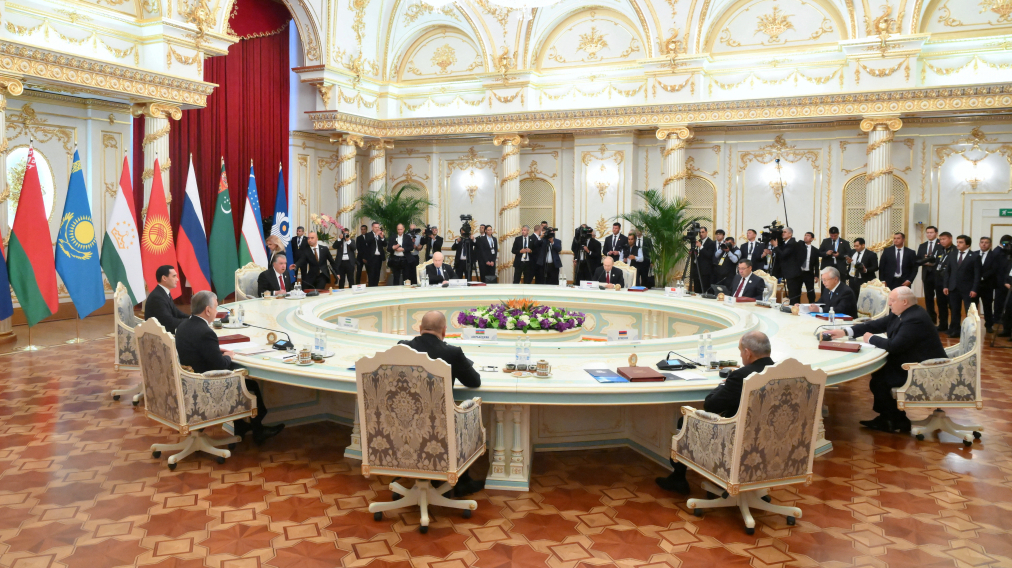Hillary Clinton denies links to Epstein, urges lawmakers to question Trump under oath
Former U.S. Secretary of State Hillary Clinton said on Thursday (26 February) that she had no information about the criminal activities of Jeffrey Eps...

Leaders of CIS member states signed an agreement establishing the new ‘CIS Plus’ format at a summit in Dushanbe, expanding the organisation’s framework for cooperation with other states and regional bodies.
Eurasian leaders have signed a landmark agreement creating the “CIS Plus” format, a new platform designed to deepen cooperation between Commonwealth of Independent States (CIS) members and external partners, during the CIS Heads of State Summit in Tajikistan’s capital, Dushanbe.
According to a statement released by the Kremlin, a total of 19 documents were signed following the meeting, including decisions on the establishment of the “CIS Plus” format and the granting of observer status to the Shanghai Cooperation Organization (SCO) within the CIS.
The summit, chaired by Tajikistan’s President Emomali Rahmon, brought together the heads of Azerbaijan, Armenia, Belarus, Kazakhstan, Kyrgyzstan, Russia, Turkmenistan, and Uzbekistan, as well as CIS Secretary-General Sergey Lebedev. Azerbaijani President Ilham Aliyev also took part in the discussions.
During the meeting, the leaders reviewed key areas of cooperation and adopted several strategic documents, including programmes to counter terrorism and extremism (2026–2028), strengthen border security (2026–2030), and the Concept of Military Cooperation until 2030. A declaration on regional energy security was also approved.
Russian President Vladimir Putin, who attended the restricted-format session, voiced Moscow’s strong support for the “CIS Plus” initiative, calling it an important mechanism to engage a broader circle of states and organisations.
“This will allow us to more actively engage other states and international organisations in the Commonwealth,” Putin said, according to a Kremlin transcript, also highlighting Russia’s backing for closer cooperation between the CIS and the SCO.
Putin also congratulated Turkmenistan on assuming the CIS chairmanship for 2026, inviting leaders to an informal CIS meeting in St. Petersburg later this year.
He noted that he had discussed with several counterparts the outcome of his August summit in Alaska with U.S. President Donald Trump, describing the talks as “positive” and noting that Moscow’s subsequent approach to resolving the conflict in Ukraine would be guided by the principles agreed there.
The CIS, founded in 1991 after the collapse of the Soviet Union, includes Armenia, Azerbaijan, Belarus, Kazakhstan, Kyrgyzstan, Moldova, Russia, Tajikistan, and Uzbekistan as full members, with Turkmenistan holding associate status. Moldova suspended its participation in 2022.
The Dushanbe summit marked a new phase in the organisation’s evolution, with the “CIS Plus” framework expected to strengthen engagement with external partners and enhance the region’s collective role in Eurasian affairs.
A F-16 fighter jet of the Turkish Air Force crashed near a highway in western Türkiye early on Wednesday (25 February), killing its pilot, officials and media reports confirmed.
Newcastle United secured a 3–2 victory over Qarabağ FK in the return leg of the UEFA Champions League play-offs at St James’ Park.
Chinese President Xi Jinping and German Chancellor Friedrich Merz agreed on Wednesday in Beijing to strengthen economic cooperation while addressing trade imbalances, market access concerns, and the war in Ukraine, during Merz’s first official visit to China since taking office.
U.S. President Donald Trump declared a “golden age” for America in his first second-term State of the Union on Tuesday evening, delivering the longest-ever address at more than 90 minutes. Here are the main takeaways.
President Donald Trump delivered the first State of the Union address of his second term to Congress on Wednesday (25 February), declaring that America’s “golden age” had begun and that the country was experiencing a “turnaround for the ages.”
Former U.S. Secretary of State Hillary Clinton said on Thursday (26 February) that she had no information about the criminal activities of Jeffrey Epstein and urged lawmakers to question President Donald Trump under oath about the disgraced financier.
Denmark will hold a parliamentary election on 24 March, Prime Minister Mette Frederiksen announced on Thursday (26 February), as she seeks to capitalise on a surge in support for her defiant stance against U.S. pressure over Greenland.
Russian President Vladimir Putin’s special envoy, Kirill Dmitriev, arrived in Geneva and may hold talks with U.S. officials, according to the RIA news agency.
U.S. Department of Justice (DOJ) documents have revealed the late Jeffrey Epstein’s extensive connections across politics, business and academia, prompting resignations, investigations and renewed public scrutiny of his influence.
The president and chief executive of the World Economic Forum (WEF), Børge Brende, announced on Thursday (26 February) that he is stepping down, weeks after the organisation launched an independent investigation into his relationship with convicted sex offender Jeffrey Epstein.
You can download the AnewZ application from Play Store and the App Store.

What is your opinion on this topic?
Leave the first comment